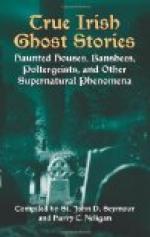“Loftus Hall, in County Wexford, was built on the site of a stronghold erected by Raymond, one of Strongbow’s followers. His descendants forfeited it in 1641, and the property subsequently fell into the hands of the Loftus family, one of whom built the house and other buildings. About the middle of the eighteenth century, there lived at Loftus Hall Charles Tottenham, a member of the Irish Parliament, known to fame as ‘Tottenham and his Boots,’ owing to his historic ride to the Irish capital in order to give the casting vote in a motion which saved £80,000 to the Irish Treasury.
“The second son, Charles Tottenham, had two daughters, Elizabeth and Anne, to the latter of whom our story relates. He came to live at Loftus Hall, the old baronial residence of the family, with his second wife and the two above-mentioned daughters of his first wife. Loftus Hall was an old rambling mansion, with no pretence to beauty: passages that led nowhere, large dreary rooms, small closets, various unnecessary nooks and corners, panelled or wainscotted walls, and a tapestry chamber. Here resided at the time my story commences Charles Tottenham, his second wife and his daughter Anne: Elizabeth, his second daughter, having been married. The father was a cold austere man; the stepmother such as that unamiable relation is generally represented to be. What and how great the state of lonely solitude and depression of mind of poor Anne must have been in such a place, without neighbours or any home sympathy, may easily be imagined.
“One wet and stormy night, as they sat in the large drawing-room, they were startled by a loud knocking at the outer gate, a most surprising and unusual occurrence. Presently the servant announced that a young gentleman on horseback was there requesting lodging and shelter. He had lost his way, his horse was knocked up, and he had been guided by the only light which he had seen. The stranger was admitted and refreshed, and proved himself to be an agreeable companion and a finished gentleman—far too agreeable for the lone scion of the House of Tottenham, for a sad and mournful tale follows, and one whose strange results continued almost to the present day.
“Much mystery has involved the story at the present point, and in truth the matter was left in such silence and obscurity, that, but for the acts of her who was the chief sufferer in it through several generations, nothing would now be known. The fact, I believe, was—which was not unnatural under the circumstances—that this lonely girl formed a strong attachment to this gallant youth chance had brought to her door, which was warmly returned. The father, as was his stern nature, was obdurate, and the wife no solace to her as she was a step-mother. It is only an instance of the refrain of the old ballad, ‘He loved, and he rode away’; he had youth and friends, and stirring scenes, and soon forgot his passing attachment. Poor Anne’s reason gave way.




